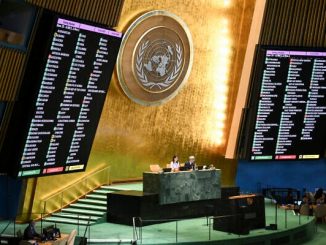
An Iranian missile that hit Haifa, Israel, on Friday morning damaged a historic local mosque and injured the imams who were worshipping there.
| Published June 20, 2025
On the morning of June 20, amid a heavy barrage of 20–30 missiles fired by Iran, one missile landed in Haifa’s Wadi Nisnas—a mixed-faith neighborhood known for peaceful coexistence. The strike struck the 18th-century Al‑Jarina Mosque, injuring multiple imams and disrupting a city symbolically rooted in religious coexistence
🚨 Casualties and Collateral Damage
-
Local hospitals reported at least 19 to 23 people wounded, including several seriously; among the injured were Muslim clerics inside the mosque during morning worship .
-
Beyond the mosque, missile debris caused damage to nearby residential areas and an oil facility, triggering fires and raising alarms about wider civilian harm.
📜 Target or Crossfire?
Despite Iran’s claim that the barrage was aimed at Israeli military and infrastructure targets, the mosque’s historical and religious significance as a centuries-old Ottoman-era structure raises questions about intent and indiscriminate targeting.
🌍 Political and Symbolic Fallout
-
Israel’s leadership swiftly condemned the strike:
-
Foreign Minister Gideon Saar denounced it as a “war crime,” underscored by video footage shared on X highlighting the mosque’s interior damage.
-
President Isaac Herzog emphasized Haifa’s multicultural fabric, stating “We will defend all Israelis. All faiths included”.
-
-
The incident amplifies the moral and diplomatic stakes in the Iran–Israel exchange and intensifies scrutiny over Iran’s choice of targets.
 Implications
Implications
1. Civilian and Religious Sites Now in the Crosshairs
The missile’s impact on a centuries-old mosque signals a dangerous shift—religious and civilian landmarks are no longer spared. Whether intentional or collateral, it underscores the growing disregard for protected sites in modern warfare.
2. Erosion of Haifa’s Interfaith Harmony
Haifa has long been a symbol of coexistence between Jews, Muslims, and Christians. Striking a central mosque deepens communal trauma and risks unraveling years of cultural and religious stability within the city.
3. International Legal Consequences
Under international law, places of worship are protected from military targeting. Even if unintended, the damage could qualify as a war crime and increase diplomatic pressure on Iran from Muslim-majority nations and neutral international bodies.
4. Strategic Escalation Risks
This strike widens the conflict’s scope from military-to-military exchanges to urban and cultural targeting. It raises the risk that both sides might increasingly target civilian infrastructure—accelerating toward total war dynamics.
5. Reputational Blow to Iran Among Muslims
While Iran claims to defend Muslim interests, striking a mosque—especially in a mixed-faith city—undermines that image, potentially alienating Arab and Muslim allies who value cultural heritage and religious sanctity.
 Overall Takeaway:
Overall Takeaway:
The Iranian missile strike that damaged Haifa’s historic Al-Jarina Mosque didn’t just injure imams—it struck at the heart of a city known for religious coexistence. In a war increasingly defined by blurred lines between military and civilian targets, this incident underscores the rising cost of regional conflict—not just in lives, but in cultural and spiritual identity. As missiles fall, so too does the moral ground, leaving behind not only rubble, but a warning: when even houses of worship are no longer safe, the war has already gone too far.





Be the first to comment